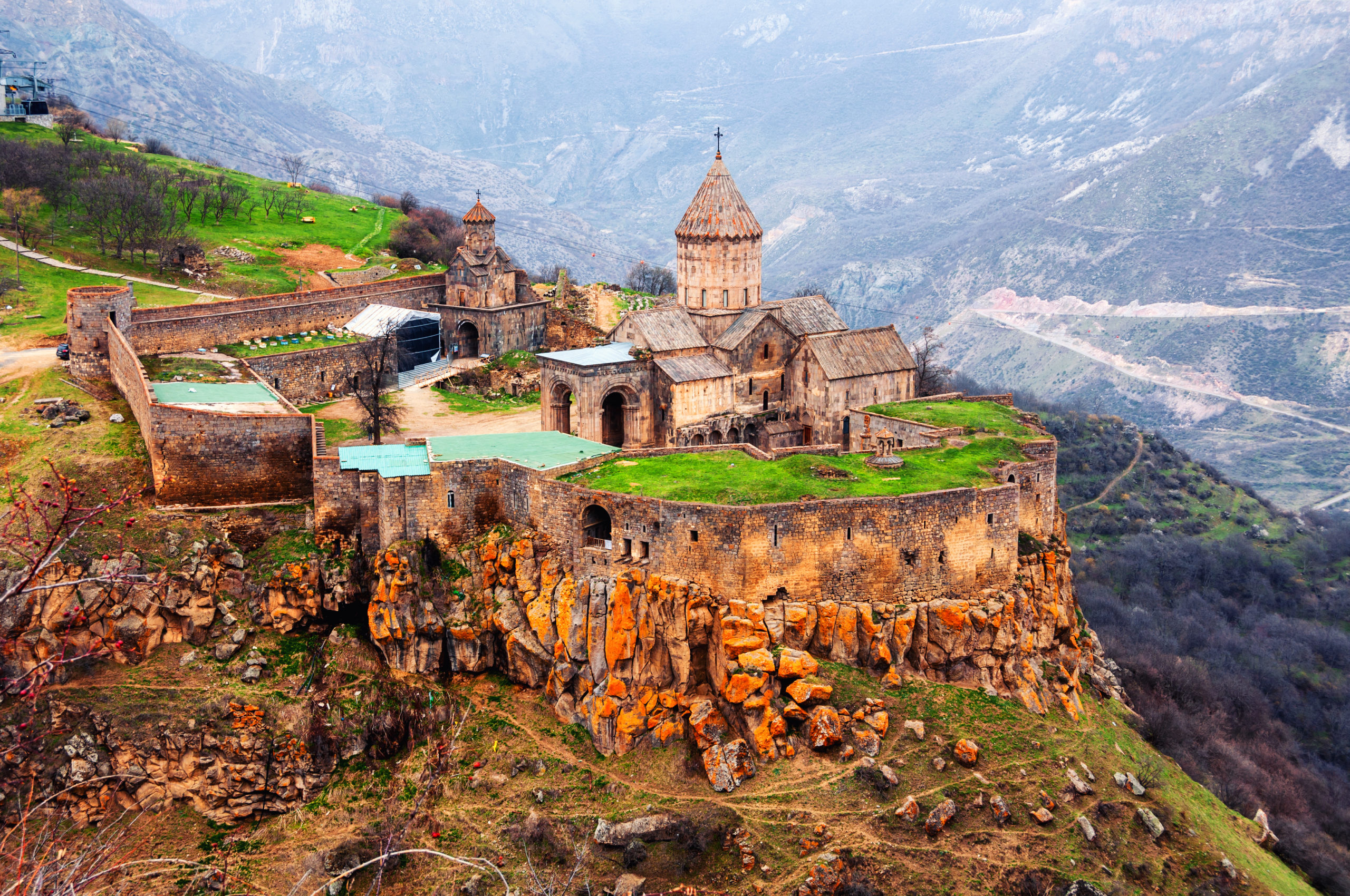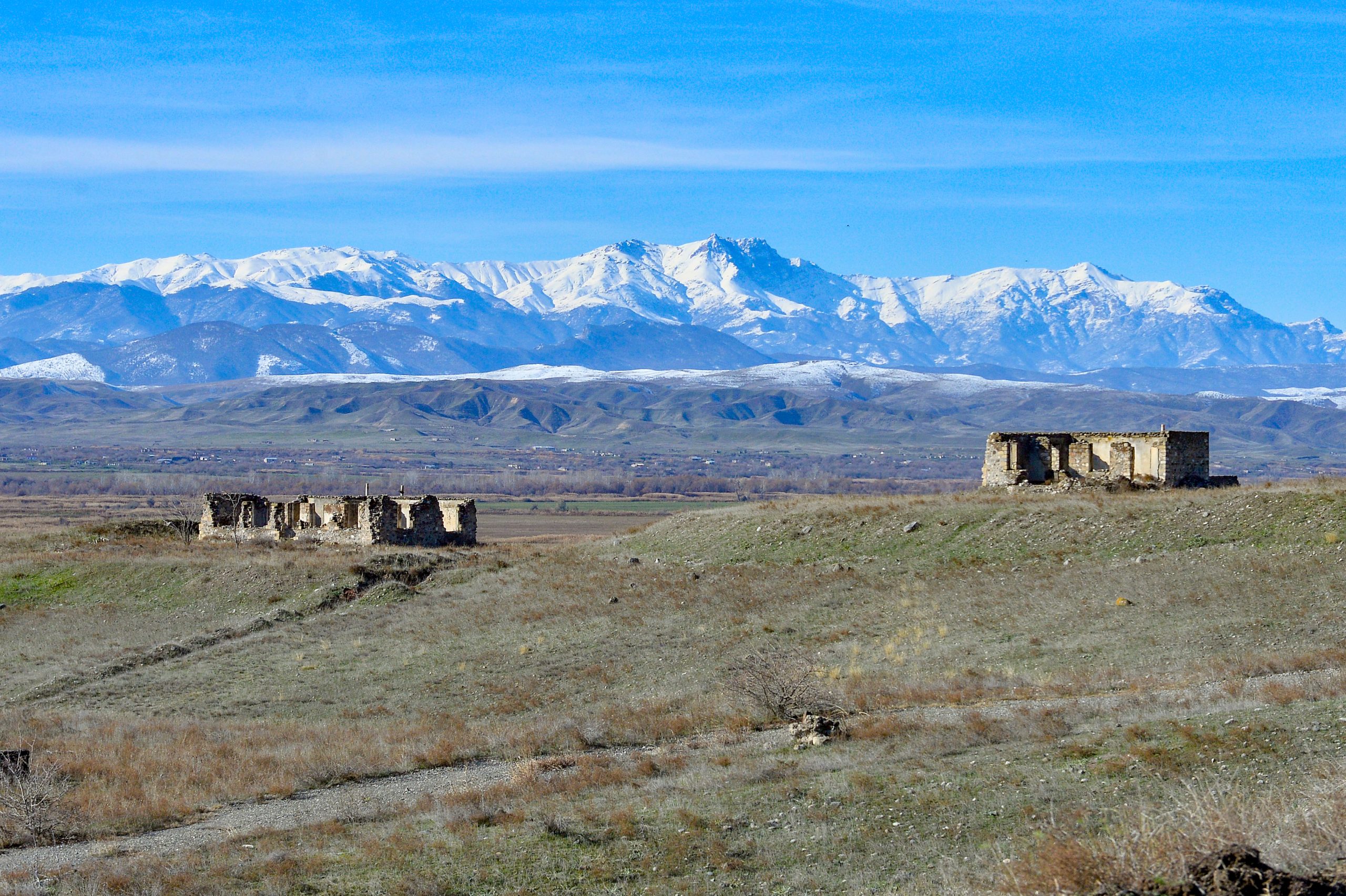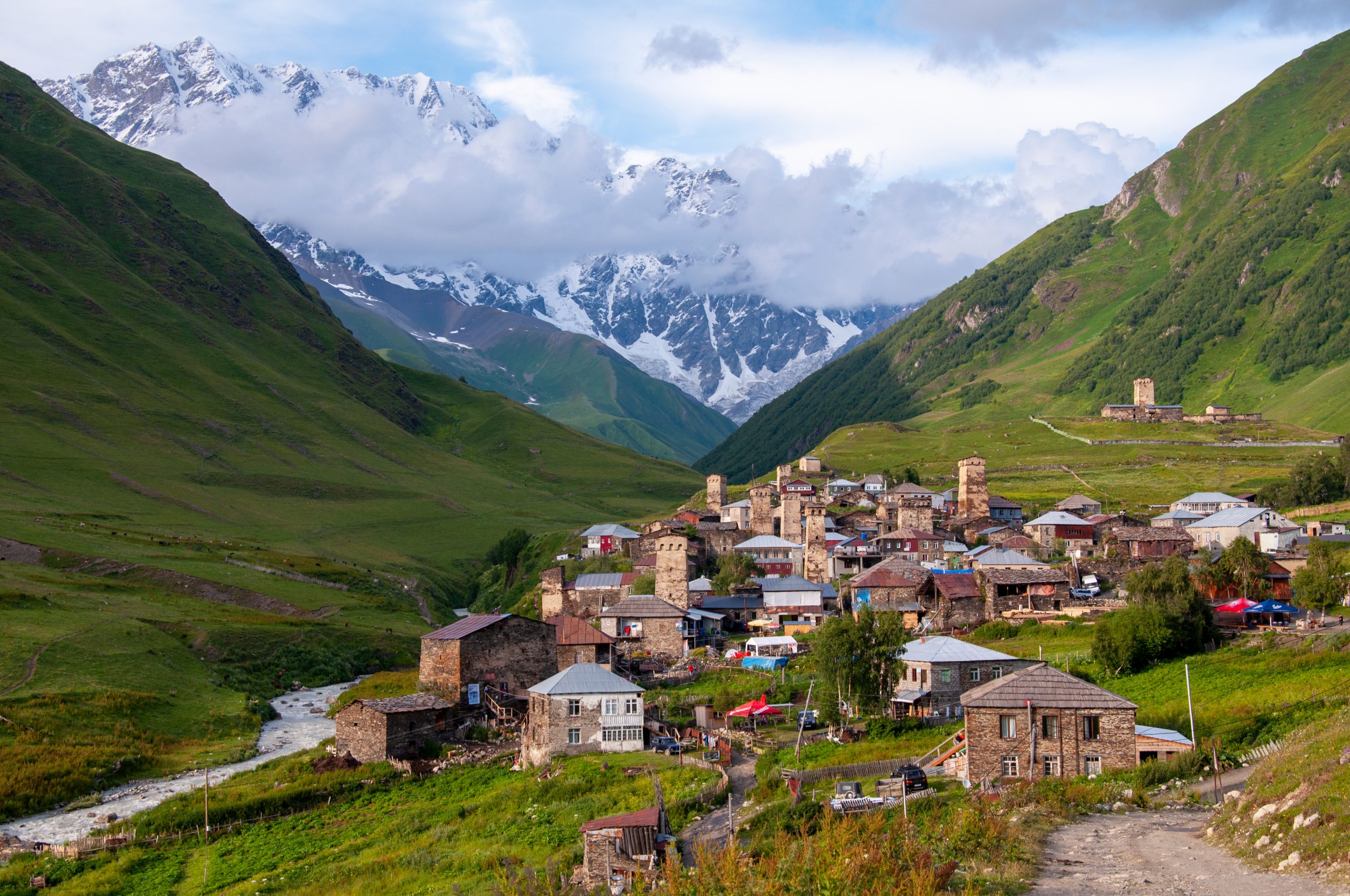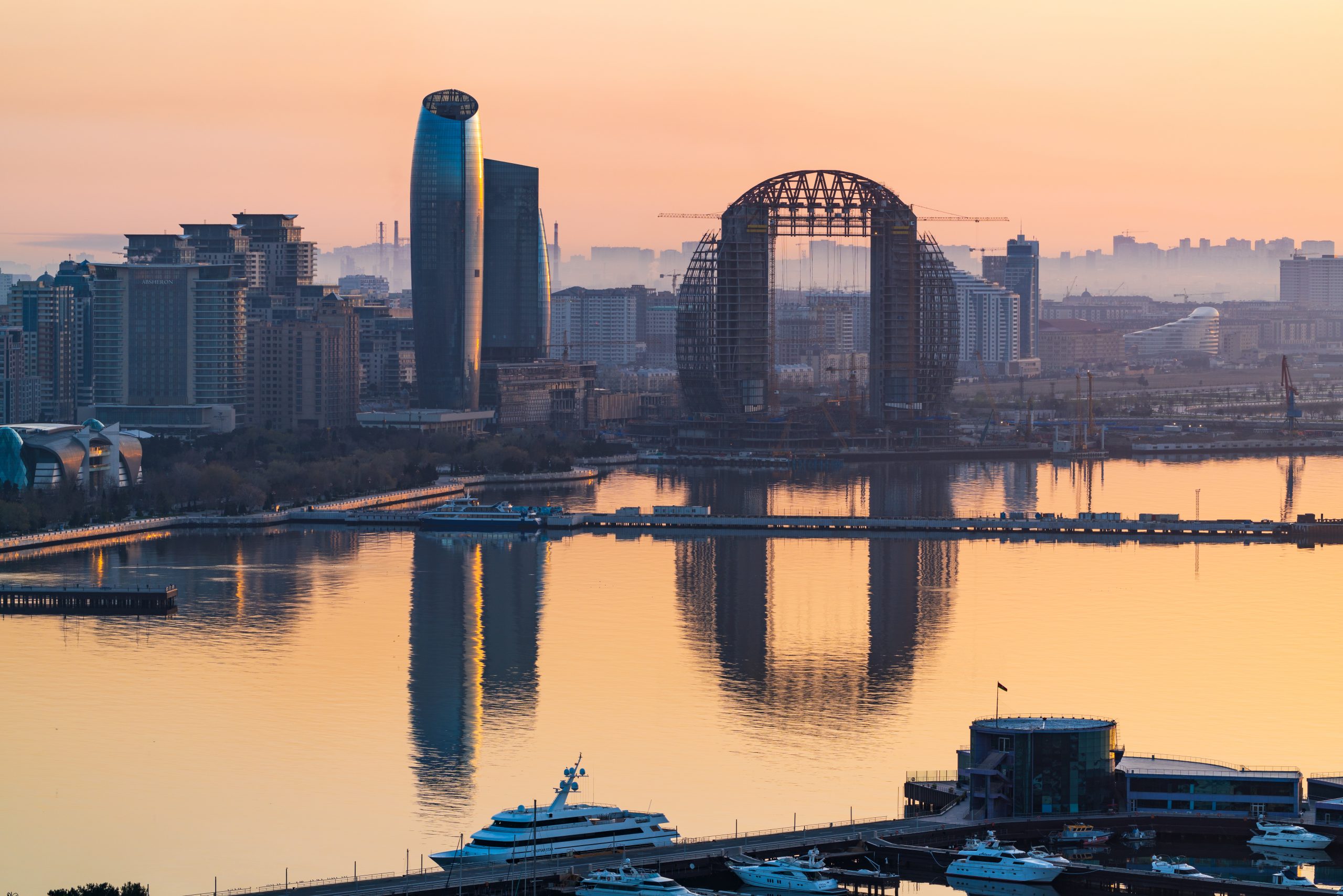Strategic Analysis Caucasus Brief
Bi-weekly review (04.06 -18. 06. 2023)
Tomáš Baranec
Armenia

Tatev, Armenia. Photo: Shutterstock.com
European Union Monitoring Mission in Armenia to open new operational centres
European Union Mission in Armenia (EUMA) will open new operational centres in Armenia, the head of this mission, Markus Ritter, announced on June 7. The mission plans to open three additional operational centres in Jermuk, Ijevan, and Yeghegnadzor in the coming months; gradually reaching full readiness in the near future, Ritter added.
According to him, in the first three months since the start of the mission, they have carried out a total of more than 300 patrols from its centres in Goris, Jermuk, and Martuni, and these patrols cover more than 3,800 kilometres each week.
Political scientist Gurgen Simonyan said JAM News that the EU mission intends to place its observers in the direction where “the armed forces of Azerbaijan are illegally present.” He believes monitoring these sections of the Armenian border “will help to neutralise Baku’s destructive and destabilising steps.” “The additional accumulation of forces and the activation of Azerbaijan near Yeghegnadzor are aimed at cutting off the Tigranashen-Yeghegnadzor connection, having control over this small area and tearing off Syunik [the southern region of Armenia bordering Azerbaijan]. The EU mission is expanding to contain Baku’s provocations,” he explained.
On February 20, a 100-person European mission with a two-year mandate was deployed in Armenia. The purpose of the mission is to contribute to the stability in the border regions of Armenia, strengthening confidence in the location and ensuring conditions conducive to the efforts aimed at normalising relations between Armenia and Azerbaijan.
The EUMA headquarters is located in Yeghegnadzor, and it has six operational centres and a liaison office in the capital Yerevan.
Sources:
-
JAM News, „EU mission expands to contain Baku’s provocations – Armenian political scientist“, https://jam-news.net/new-operation-centers-for-the-eu-mission/
-
NEWS.am, „EU mission in Armenia to set up additional operational centres in Jermuk, Ijevan, Yeghegnadzor cities in coming months“, https://news.am/eng/news/764161.html
Foreign nationals injured as US investment comes under fire in Armenia
On June 14, Armenia’s Defence Ministry accused Azerbaijan of inventing a ceasefire violation as a pretext to open fire on the plant in Yeraskh village of Armenia. During the attack, two foreign nationals from India, who are employed as construction workers in the area, were injured.
Armenian Defence Minister Suren Papikyan warned lawmakers on June 15 that Azerbaijan’s disinformation campaign lays the groundwork for more attacks against Armenian positions and paints Armenia as the aggressor. The Armenian Foreign Ministry accused Azerbaijan of “hindering Armenia’s economic development and foreign investments”.
Azerbaijan’s Foreign Ministry and Defence Ministry, however, denied the accusations. “Regarding the allegations that Azerbaijan aims to prevent the attraction of investments in Armenia by creating provocations, let us note that Armenia pursued a policy of self-isolation by making territorial claims against neighbouring countries and keeping the territories of Azerbaijan under occupation for nearly 30 years, thereby all excluded from international projects”, the Foreign Ministry said.
Baku, however, has opposed the construction of the given metallurgical plant. Earlier in June, Azerbaijan’s Ministry of Environment accused Armenia of violating international norms with the factory, which would damage Azerbaijan’s environment.
Members of the European Union Monitoring Mission in Armenia also visited the area following the news, with the EU special representative to the South Caucasus, Toivo Klaar, posting a mild statement saying that the “shooting in all areas needs to stop”. The US State Department spokesperson Matthew Miller reacted on Twitter, expressing concerns that two civilian employees of a US-affiliated company in Armenia sustained injuries from gunfire from Azerbaijan’s direction.
The plant is located in Yeraskh, south of Yerevan and near the border with the Azerbaijani exclave of Nakhchivan. It is being constructed by GTB Steel, a joint venture between Armenian citizen Grigor Ter-Ghazaryan and Indian-American investor Bobby Kang.
Sources:
- AVETISYAN Ani, OC Media, “Foreign nationals injured as US investment comes under fire in Armenia“, https://oc-media.org/foreign-nationals-injured-as-us-investment-comes-under-fire-in-armenia/
- Asbarez.com, “2 Foreign Nationals Injured as Azerbaijan Targets Positions 42 Miles Outside Yerevan“, https://asbarez.com/2-foreign-nationals-injured-as-azerbaijan-targets-positions-42-miles-outside-yerevan/

Zangilan District, Azerbaijan. Photo: Shutterstock.com
Trade turnover between Armenia and Eurasian Economic Union countries increased by 92% last year
At a discussion of the implementation of the 2022 state budget on June 6, Deputy Minister of Economy Narek Teryan informed that the trade turnover between Armenia and other countries of the Eurasian Economic Union (EAEU) in 2022 amounted to 5.2 billion USD, which is 92.7% higher than the previous year.
As the Caucasus Watch informed, the volume of exports from Armenia to the EAEU countries at the end of last year amounted to 2.5 billion USD (an increase of 2.8 times in annual terms), and imports – 2.7 billion USD (+49%). “Commodity turnover has increased with all member countries (EAEU). We can say we are pursuing a very balanced (trade) policy,” the Deputy Minister informed the parliamentarians.
The total volume of foreign trade turnover in Armenia in January-December 2022 reached 14 billion 128 million 800 thousand USD. “In 2022, the volume of foreign investments in the real sector of the Armenian economy amounted to 196 billion drams (505 million USD), of which 158 billion drams (407 million USD) came from the EAEU countries,” the Deputy Minister of Economy said.
Sources:
-
Caucasus Watch, „Trade Turnover Between Armenia and Eurasian Economic Union Countries Increases by 92%“,https://caucasuswatch.de/en/news/trade-turnover-between-armenia-and-eurasian-economic-union-countries-increases-by-92.html
Leading Armenian opposition figure detained on embezzlement charges
The Anti-Corruption Court jailed Vice President of the Republican Party of Armenia Armen Ashotyan on June 14 in pre-trial detention for two months, reported local media.
Ashotyan, a former minister of education, was taken into custody on June 14 for allegedly violating bail restrictions ordered by a court amid an ongoing investigation into alleged abuse of power and embezzlement in the Yerevan State Medical University that is said to have happened during his tenure as education minister and Chairman of the Board of Trustees of the university.
He is accused of abetting then-rector Mikayel Narimanyan in committing misconduct and inflicting over 38 million Armenian drams in property damages to the university.
Armen Ashotyan denies wrongdoing and claims the charges against him are politically motivated. Ashotyan worked as an advisor to the rector of Yerevan State Medical University voluntarily from 2005-2006, and later from 2009-2016, he served as Minister of Education and Science.
Sources:
- Armenpress.am, „Former minister of education Armen Ashotyan jailed in pre-trial detention“, https://armenpress.am/eng/news/1113430.html
- Arka.am, “Deputy chairman of Republican Party of Armenia Armen Ashotyan arrested for two months“, http://arka.am/en/news/politics/deputy_chairman_of_republican_party_of_armenia_armen_ashotyan_arrested_for_two_months/
Russian peacekeepers blamed for Armenian-Azeri shootout
Armenia’s Foreign Ministry summoned the Russian ambassador in Yerevan on June 16 to accuse Russian peacekeepers of being responsible for an earlier shootout between Armenian and Azerbaijani border guards near the Lachin corridor.
Yerevan says that Armenian border guards deployed nearby opened fire to stop a group of Azerbaijani servicemen manning the checkpoint from advancing into Armenian territory and placing an Azerbaijani flag there. One Azerbaijani soldier was injured as a result. Baku insists that they did not cross into Armenia.
A video of the incident suggests that the Azerbaijani servicemen were escorted and seemingly protected by Russian soldiers as they crossed a bridge over the Hakari River flowing through the Lachin district to hoist the flag.
In a written statement to RFE/RL’s Armenian Service, the Foreign Ministry said afterwards that it conveyed to Russian Ambassador Sergei Kopyrkin Armenia’s “strong discontent” with the Russian peacekeepers’ actions. It said it urged Russia to “take all necessary steps to ascertain the circumstances of the incident and correct the situation.” Earlier, Kopyrkin was seen entering the Foreign Ministry building in Yerevan. He spent about an hour there.
Shortly after the shootout, Baku suspended the movement of humanitarian convoys organised by Russian peacekeepers and the International Committee of the Red Cross (ICRC) through the Lachin corridor. The de facto authorities in Nagorno-Karabakh responded that holding a dialogue with Baku is “unrealistic” following Azerbaijan’s decision to close the Lachin corridor checkpoint to all traffic, including humanitarian aid.
The new escalation came at the same time a small but growing number of Karabakh Armenians started to use the Azerbaijani checkpoint on the bridge to enter de facto Nagorno Karabakh. Along with the videos appearing in Azerbaijani media, a local newspaper in de facto Nagorno-Karabakh reported on June 9 that 150 civilians were transported to Armenia and 160 from Armenia to Karabakh through the Azerbaijani border post in the previous week.
For the past seven months, the Lachin corridor has been accessible only to vehicles accompanied by Russian peacekeeping forces and the ICRC. This arrangement has allowed for food and necessary supplies to Nagorno-Karabakh, and the Red Cross has facilitated the evacuation of critically ill patients for medical treatment in Armenian hospitals.
Sources:
-
Caucasus Watch, „Relief Delivery to Karabakh Blocked by Azerbaijan“, https://caucasuswatch.de/en/news/relief-delivery-to-karabakh-blocked-by-azerbaijan.html
-
Azatutyun.am, “Russian Peacekeepers Blamed For Armenian-Azeri Shootout“, https://www.azatutyun.am/a/32462765.html
-
SHAHVERDYAN Lilit, Eurasianet.org, “Armenians start using Azerbaijani border post“, https://eurasianet.org/armenians-start-using-azerbaijani-border-post-0
Series of attacks on government critics in Georgia
Government critics in Georgia, including an opposition leader, a youth camp, and student protesters, have been attacked, apparently by supporters of the ruling Georgian Dream party, in a series of violent incidents over the weekend, reported OC Media.
On June 17, students attempting to protest a lecture by Georgian Dream chair Irakli Kobakhidze at the Tbilisi State University (TSU) were attacked by party supporters. Georgian Dream’s youth wing members are reported to have taken part in the attack, which left at least one student hospitalised. The confrontation at TSU took place as several students attempted to unfurl protest banners over a stairwell in the university as the chair of Georgian Dream, Irakli Kobakhidze, was due to hold a lecture. They were prevented from doing so by his security detail.
Footage from the university shows a group of young men then attacking the students on the stairs. According to the pro-opposition TV channel Mtavari, the young men who attacked the student protesters on Saturday emerged from the lecture hall where Kobakhidze was due to speak to confront them. The channel said this included members of the ruling Georgian Dream youth wing. Local media reported that several people fell down the stairs during the violence, with some requiring medical care.
In a separate incident earlier on the same day, Zurab Japaridze, who leads the libertarian opposition party Girchi — More Freedom, was attacked in Gori. A local resident of Gori said in his social media post later during the day he was responsible for assaulting the party leader, telling his followers the politician had been “beaten for perverting our children, for insulting the [Catholicos Patriarch of the Georgian Orthodox Church] and the Church”.
The Georgian Interior Ministry on Saturday said it had launched an investigation into an assault. Public Defender Levan Ioseliani condemned the attack on Japaridze on Saturday and noted his office would study the incident.
Japaridze was travelling to lecture at a youth camp, which was attacked later that day too. A violent mob – reportedly 50-60 men – threw stones, red paint, and shouted insults at the hotel in Borjomi where a youth summer camp was taking place. According to the camp organisers, it took police almost an hour to arrive at the scene. According to the latest information, the camp is suspended, and the participants have reportedly been driven to the safety of their homes.
The camp, titled Liberal Education Academy, is bringing together 15-16-year-old students and is held by the Insitute for Individual Liberty (IFIL), an activist civil society group. Japaridze is one of the more visible leaders of the liberal opposition.
As Civil.ge reminded, liberal-minded youth movements Franklin Club, the Institute for Individual Liberty, Shame Movement, and Droa! were targeted by the ruling party and its affiliated media with incendiary rhetoric as the authorities accused them of inciting violence during the protest rallies in March. The ruling party also lashed out at Georgia’s European partners for funding these outlets. Japaridze was also personally targeted by such attacks.
Sources:
-
SHOSHIASHVILI Tata, OC Media, “Series of attacks on government critics in Georgia“, https://oc-media.org/series-of-attacks-on-government-critics-in-georgia/
-
Civil.ge, „Violent Mob Attacks Opposition Politician, Youth Camp“, https://civil.ge/archives/548564
-
Agenda.ge, „Investigation launched after assault on opposition party leader“, https://agenda.ge/en/news/2023/2375
Georgian miners strike as company cites global market crisis
On June 19, more than 3,000 miners who have been on strike in the western Georgian city of Chiatura for 14 days pledged they would continue protests in the capital Tbilisi, following an offer by their employer to raise their pay by 5%, which the workers have called “insulting”. The striking miners have announced their intention to launch a hunger strike outside the Parliament building in the capital and said their average monthly salaries stood at 400 USD, making them “unable to feed families and meet [loan] obligations” while also highlighting safety conditions they have called inadequate, and polluted environment in the city.
The miners had demanded a 40% wage increase from Georgian Manganese, the company operating their mines in Chiatura, and said about 50 of them would go on a hunger strike starting on Monday to exert pressure on the employer to increase salaries and meet other demands. Their other requests include improvements in safety conditions, better insurance and nutrition, 12-hour shifts, vacations, technology upgrades and curbing of pollution caused by the extraction.
For months, industry representatives have been complaining about globally falling prices and demand for ferroalloys, with production costs surpassing the market value and making it unprofitable to continue exports. The crisis, they say, was deepened by Russia effectively closing its import market through the imposition of duties. Georgia’s official statistics have shown ferroalloy exports rapidly falling in January-April this year.
In May, three months after the initial halt, the company told over 700 miners to return to work, hoping to revive production through what it sees as work “optimisation.” Optimisation means moving those working 12-hour shifts to 8-hour shifts without changing the overall monthly work hours or pay. The company also pointedly said that “there will be no compensation for anything that brings no economic benefit to the company.”
The workers object to the change. The increased work intensity creates health and safety concerns. In contrast, the increased number of workdays interferes with their routine and thus their ability to pursue alternate sources of income, they say.
They also fear that it will be challenging to fulfil the daily work plan under the new, more demanding system, leaving them without full payment as well as the bonuses and benefits they used to rely on.
In 2021, ferroalloys accounted for 11.3% of Georgia’s annual exports, topped only by copper ores and cars on the list of most-exported products. A slight downturn was already felt in 2022, but the drop is expected to be sharper this year: the exports fell from around 51 million USD in January to only 2.5 million USD in April. The decline is most apparent in the sales to the United States, which had been the top importer of Georgian ferroalloys in 2021-2022, only to land in third place in the first four months of 2023 after Russia and Turkey.
Sources:
-
Agenda.ge, „Striking miners in Georgia’s west announce rallies in Tbilisi after employer’s “insulting” wage offer“, https://agenda.ge/en/news/2023/2380
-
GABRITCHIDZE Nini, EUrasianet.org, „Georgian miners strike as company cites global market crisis“, https://eurasianet.org/georgian-miners-strike-as-company-cites-global-market-crisis

Svaneti, Georgia. Photo: Shutterstock.com
UNGA adopts Georgia IDP resolution
On June 7, the United Nations General Assembly (UNGA) adopted a resolution on the status of internally displaced persons and refugees from de facto Abkhazia and de facto South Ossetia.
Sponsored by Georgia along with 60 other member states from various regions of the world, the resolution affirmed the right of IDPs to return to their homes “in safety and dignity”, regardless of ethnicity.
It also emphasised the need to respect and protect their property rights and reaffirmed the “unacceptability” of forced demographic changes. In addition, the resolution instructed the UN Secretary-General to prepare an annual report on the implementation of the resolution, which is an “important international instrument” for the monitoring of the human rights situation in the separatist regions of Georgia, as well as for “raising awareness” on the problems related to the return of refugees and IDPs to their homes.
Georgian Foreign Minister Ilia Darchiashvili noted that the resolution reaffirmed the “right of all IDPs and refugees and their descendants” to return to their homes in the de facto Abkhazia and de facto South Ossetia. Alongside Russia, the vote against was cast by Belarus, Burundi, Cuba, North Korea, Nicaragua, Sudan, Syria, and Zimbabwe.
Sources:
-
Agenda.ge, „UN General Assembly adopts resolution on the status of IDPs, refugees from Russian-occupied territories of Georgia“, https://agenda.ge/en/news/2022/2182
-
Civil.ge, „UNGA Adopts Georgia IDP Resolution“, https://civil.ge/archives/547105



Contact us